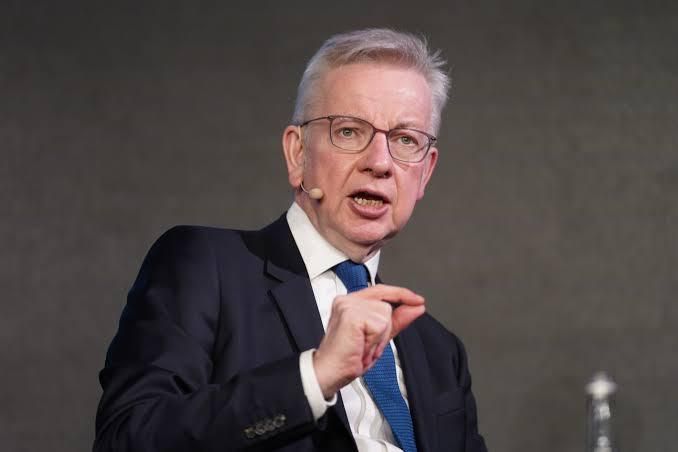It has been reported that Michael Gove has been appointed editor of The Spectator magazine by Sir Paul Marshall, who is also GB News's co-owner.
Just over three months after resigning as an MP, the contentious former Cabinet minister will start his new position on October 4—pending final permission from Acoba, a regulator that monitors new posts taken by former politicians. It implies that when the Conservative Party leadership race approaches its conclusion, he will be in charge of the publication dubbed the "Tory Bible."
He will succeed Fraser Nelson, who over the course of his 15 years in the position has set records for print circulation and successfully implemented the company's digital subscription strategy.
Additionally, it was revealed that Lord Moore, a former editor of The Telegraph and The Spectator, will take Andrew Neil's place as The Spectator's non-executive chairman.Mr Gove’s appointment will not only give him a major platform for shaping opinion around who should be the next Tory leader, but it also suggests a shift in emphasis at the influential magazine, which was fiercely opposed to the Covid lockdowns that Mr Gove championed while in government.
Mr Gove is a divisive figure in Conservative circles, having scuppered Boris Johnson’s 2016 leadership bid by standing against him after promising he would back him. It earned him a reputation as a backstabber that has stayed with him ever since.
Mr Johnson, himself a former editor of The Spectator, had run the successful Vote Leave campaign with him before they became rivals.
Mr Gove will take over as editor of the magazine three weeks before the end of the Tory leadership contest. He has in the past been a vocal supporter of Kemi Badenoch, though their relationship is said to have cooled in recent months. She told a hustings event last month that she was not “controlled” by the former housing secretary.
Mr Gove is thought to have sought the approval of the Advisory Committee on Business Appointments, which must approve any job taken by an ex-minister within two years of leaving government.
Mr Nelson, who is also a Telegraph columnist, is expected to leave the world’s oldest weekly magazine, which had become so successful under his stewardship that Sir Paul outbid Rupert Murdoch to pay £100 million for it earlier this month, around twice what it had been expected to sell for.
Mr Gove’s divisiveness in the Conservative Party was not confined to his long-running rivalry with Mr Johnson. David Cameron, now Lord Cameron, described him in his autobiography as “mendacious” after falling out with him over Brexit and said of him: “One quality shone through, disloyalty.”
Liz Truss described him as “that snake” after he helped undermine her brief premiership by saying he would not vote for her Budget when it was put before Parliament.
Sir Paul, who made his fortune as the co-founder of the hedge fund group Marshall Wace, is a former member of the Liberal Democrats who switched his allegiance to the Conservative Party because he supported Brexit.
He is co-owner of GB News and owner of the news website UnHerd, and is part of a consortium that has previously expressed an interest in buying Telegraph Media Group, the sale of which is ongoing.
Earlier this month, veteran journalist Mr Neil resigned as chairman of The Spectator with a parting shot at Sir Paul.
He told its staff: “My greatest regret is that I have not been able to find you a new home guaranteed to nurture the unique chemistry of The Spectator, which makes it so special and successful,” said Mr Neil.
“You can have all the resources in the world but if you don’t understand what really makes The Spectator tick then they will be as nought.”
He also urged Sir Paul not to interfere in editorial matters, saying: “I regarded it as my prime responsibility for 20 years to ensure [editorial independence], protecting the editor not just from outside pressures, commercial or political, but even from proprietors,” said Mr Neil.
“I cannot tell if the new owners will have the same reverence for editorial independence since they have not shared their thinking.”
Mr Gove and Sir Paul share a belief in the need for a more responsible form of capitalism, and in March, Mr Gove defended Sir Paul in the House of Commons during a debate about extremism.
Sir Paul had “liked” a tweet that said “civil war is coming” because of the increasing proportion of Muslims making up the population of Britain, which Labour criticised. Mr Gove said: “I deprecate the personal attack on Sir Paul”, describing him as “a distinguished philanthropist”.
Mr Gove’s new job marks a return to the career he left when he became an MP in 2005. He was assistant editor of The Times, having started his career in journalism working on The Telegraph’s Peterborough column.
Mr Gove is not the first former Cabinet minister to become an editor: George Osborne, the former chancellor, was appointed editor of The Evening Standard in 2017 by its owner Lord Lebedev, but he was unable to halt its decline during his three years in the job. Earlier this month, the newspaper ceased daily publication and moved to a weekly print publication model to cut costs.
Sir Paul bought The Spectator through his Old Queen Street Media company, which owns UnHerd. Its chief executive is Freddie Sayers, who is now publisher of The Spectator.
After the takeover, he promised that UnHerd and The Spectator would “remain fully separate titles, with independent editorial and governance structures”.
Mr Sayers said: “To be editor of The Spectator requires a rare breadth of intellectual interests and depth of journalistic experience.
“Alongside his political and journalistic nous, Michael brings a love of books, philosophy, art, opera – and a mischievous sense of humour. He is perfectly suited to this role, and I can’t wait to work together to bring The Spectator to new audiences.
“Fraser has achieved huge success over his 15 years as editor, modernising and building The Spectator into a formidable media brand. I am delighted that he will continue to write and, as Associate Editor, be part of The Spectator family.”
Lord Moore said: “The Spectator thrives because of its free spirit and editorial independence. Having been continuously associated with the paper for more than a fifth of its nearly 200-year history, I am honoured to have been asked to be its chairman. I look forward to its future being even greater than its past.”
Mr Nelson said: “There’s never a good time to leave a job like mine but, after 15 years and a new owner with big ambitions, there is an obvious time. In many ways, Michael is the obvious successor.
"A superb journalist who veered into politics, he served as my news editor during my early years at The Times. At the age of seven, he made his first public declaration of wanting to edit The Spectator in an Aberdeen classroom. He's made it now, at the age of 57. His background, his journalism abilities, and the calibre of the group surrounding him will be a powerful combination.
Charles, then 27 years old, was appointed editor of The Spectator before moving on to The Daily Telegraph. He is the most qualified person, in my opinion, to serve as chairman of The Spectator, with his primary responsibility being to protect editorial freedom.








.svg)


